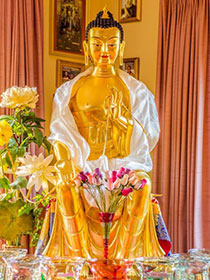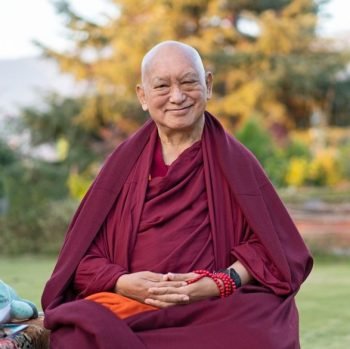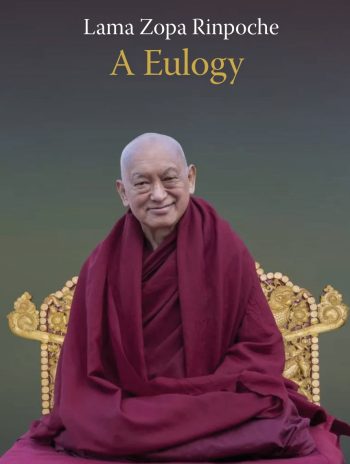- Home
- FPMT Homepage
Foundation for the Preservation of the Mahayana Tradition
The FPMT is an organization devoted to preserving and spreading Mahayana Buddhism worldwide by creating opportunities to listen, reflect, meditate, practice and actualize the unmistaken teachings of the Buddha and based on that experience spreading the Dharma to sentient beings. We provide integrated education through which people’s minds and hearts can be transformed into their highest potential for the benefit of others, inspired by an attitude of universal responsibility and service. We are committed to creating harmonious environments and helping all beings develop their full potential of infinite wisdom and compassion. Our organization is based on the Buddhist tradition of Lama Tsongkhapa of Tibet as taught to us by our founders Lama Thubten Yeshe and Lama Thubten Zopa Rinpoche.
- Willkommen
Die Stiftung zur Erhaltung der Mahayana Tradition (FPMT) ist eine Organisation, die sich weltweit für die Erhaltung und Verbreitung des Mahayana-Buddhismus einsetzt, indem sie Möglichkeiten schafft, den makellosen Lehren des Buddha zuzuhören, über sie zur reflektieren und zu meditieren und auf der Grundlage dieser Erfahrung das Dharma unter den Lebewesen zu verbreiten.
Wir bieten integrierte Schulungswege an, durch denen der Geist und das Herz der Menschen in ihr höchstes Potential verwandelt werden zum Wohl der anderen – inspiriert durch eine Haltung der universellen Verantwortung und dem Wunsch zu dienen. Wir haben uns verpflichtet, harmonische Umgebungen zu schaffen und allen Wesen zu helfen, ihr volles Potenzial unendlicher Weisheit und grenzenlosen Mitgefühls zu verwirklichen.
Unsere Organisation basiert auf der buddhistischen Tradition von Lama Tsongkhapa von Tibet, so wie sie uns von unseren Gründern Lama Thubten Yeshe und Lama Thubten Zopa Rinpoche gelehrt wird.
- Bienvenidos
La Fundación para la preservación de la tradición Mahayana (FPMT) es una organización que se dedica a preservar y difundir el budismo Mahayana en todo el mundo, creando oportunidades para escuchar, reflexionar, meditar, practicar y actualizar las enseñanzas inconfundibles de Buda y en base a esa experiencia difundir el Dharma a los seres.
Proporcionamos una educación integrada a través de la cual las mentes y los corazones de las personas se pueden transformar en su mayor potencial para el beneficio de los demás, inspirados por una actitud de responsabilidad y servicio universales. Estamos comprometidos a crear ambientes armoniosos y ayudar a todos los seres a desarrollar todo su potencial de infinita sabiduría y compasión.
Nuestra organización se basa en la tradición budista de Lama Tsongkhapa del Tíbet como nos lo enseñaron nuestros fundadores Lama Thubten Yeshe y Lama Zopa Rinpoche.
A continuación puede ver una lista de los centros y sus páginas web en su lengua preferida.
- Bienvenue
L’organisation de la FPMT a pour vocation la préservation et la diffusion du bouddhisme du mahayana dans le monde entier. Elle offre l’opportunité d’écouter, de réfléchir, de méditer, de pratiquer et de réaliser les enseignements excellents du Bouddha, pour ensuite transmettre le Dharma à tous les êtres. Nous proposons une formation intégrée grâce à laquelle le cœur et l’esprit de chacun peuvent accomplir leur potentiel le plus élevé pour le bien d’autrui, inspirés par le sens du service et une responsabilité universelle. Nous nous engageons à créer un environnement harmonieux et à aider tous les êtres à épanouir leur potentiel illimité de compassion et de sagesse. Notre organisation s’appuie sur la tradition guéloukpa de Lama Tsongkhapa du Tibet, telle qu’elle a été enseignée par nos fondateurs Lama Thoubtèn Yéshé et Lama Zopa Rinpoché.
Visitez le site de notre Editions Mahayana pour les traductions, conseils et nouvelles du Bureau international en français.
Voici une liste de centres et de leurs sites dans votre langue préférée
- Benvenuto
L’FPMT è un organizzazione il cui scopo è preservare e diffondere il Buddhismo Mahayana nel mondo, creando occasioni di ascolto, riflessione, meditazione e pratica dei perfetti insegnamenti del Buddha, al fine di attualizzare e diffondere il Dharma fra tutti gli esseri senzienti.
Offriamo un’educazione integrata, che può trasformare la mente e i cuori delle persone nel loro massimo potenziale, per il beneficio di tutti gli esseri, ispirati da un’attitudine di responsabilità universale e di servizio.
Il nostro obiettivo è quello di creare contesti armoniosi e aiutare tutti gli esseri a sviluppare in modo completo le proprie potenzialità di infinita saggezza e compassione.
La nostra organizzazione si basa sulla tradizione buddhista di Lama Tsongkhapa del Tibet, così come ci è stata insegnata dai nostri fondatori Lama Thubten Yeshe e Lama Zopa Rinpoche.
Di seguito potete trovare un elenco dei centri e dei loro siti nella lingua da voi prescelta.
- 欢迎 / 歡迎
简体中文
“护持大乘法脉基金会”( 英文简称:FPMT。全名:Foundation for the Preservation of the Mahayana Tradition) 是一个致力于护持和弘扬大乘佛法的国际佛教组织。我们提供听闻,思维,禅修,修行和实证佛陀无误教法的机会,以便让一切众生都能够享受佛法的指引和滋润。
我们全力创造和谐融洽的环境, 为人们提供解行并重的完整佛法教育,以便启发内在的环宇悲心及责任心,并开发内心所蕴藏的巨大潜能 — 无限的智慧与悲心 — 以便利益和服务一切有情。
FPMT的创办人是图腾耶喜喇嘛和喇嘛梭巴仁波切。我们所修习的是由两位上师所教导的,西藏喀巴大师的佛法传承。
繁體中文
護持大乘法脈基金會”( 英文簡稱:FPMT。全名:Found
ation for the Preservation of the Mahayana Tradition ) 是一個致力於護持和弘揚大乘佛法的國際佛教組織。我們提供聽聞, 思維,禪修,修行和實證佛陀無誤教法的機會,以便讓一切眾生都能 夠享受佛法的指引和滋潤。 我們全力創造和諧融洽的環境,
為人們提供解行並重的完整佛法教育,以便啟發內在的環宇悲心及責 任心,並開發內心所蘊藏的巨大潛能 — 無限的智慧與悲心 – – 以便利益和服務一切有情。 FPMT的創辦人是圖騰耶喜喇嘛和喇嘛梭巴仁波切。
我們所修習的是由兩位上師所教導的,西藏喀巴大師的佛法傳承。 察看道场信息:
- FPMT Homepage
- News/Media
-
- Study & Practice
-
-
- About FPMT Education Services
- Latest News
- Programs
- New to Buddhism?
- Buddhist Mind Science: Activating Your Potential
- Heart Advice for Death and Dying
- Discovering Buddhism
- Living in the Path
- Exploring Buddhism
- FPMT Basic Program
- FPMT Masters Program
- FPMT In-Depth Meditation Training
- Maitripa College
- Lotsawa Rinchen Zangpo Translator Program
- Universal Education for Compassion & Wisdom
- Online Learning Center
-
- Prayers & Practice Materials
- Overview of Prayers & Practices
- Full Catalogue of Prayers & Practice Materials
- Explore Popular Topics
- Benefiting Animals
- Chenrezig Resources
- Death & Dying Resources
- Lama Chopa (Guru Puja)
- Lama Zopa Rinpoche: Compendium of Precious Instructions
- Lama Zopa Rinpoche: Life Practice Advice
- Lama Zopa Rinpoche Practice Series
- Lamrim Resources
- Mantras
- Prayer Book Updates
- Purification Practices
- Sutras
- Thought Transformation (Lojong)
- Audio Materials
- Dharma Dates - Tibetan Calendar
- Translation Services
- Publishing Services
- Ways to Offer Support
- Prayers & Practice Materials
-
- Teachings and Advice
- Find Teachings and Advice
- Lama Zopa Rinpoche Advice Page
- Lama Zopa Rinpoche: Compendium of Precious Instructions
- Lama Zopa Rinpoche Video Teachings
- ༧སྐྱབས་རྗེ་བཟོད་པ་རིན་པོ་ཆེ་མཆོག་ནས་སྩལ་བའི་བཀའ་སློབ་བརྙན་འཕྲིན།
- Podcasts
- Lama Yeshe Wisdom Archive
- Buddhism FAQ
- Dharma for Young People
- Resources on Holy Objects
- Teachings and Advice
-
-
*If a menu item has a submenu clicking once will expand the menu clicking twice will open the page.
-
-
- Centers
-
- Teachers
-
- Projects
-
-
-
-
*If a menu item has a submenu clicking once will expand the menu clicking twice will open the page.
-
-
- FPMT
-
-
-
-
-
It’s the foggy mind, the mind that’s attracted to an object and paints a distorted projection onto it, that makes you suffer. That’s all. It’s really quite simple.
Lama Thubten Yeshe
-
-
-
- Shop
-
-
-
The Foundation Store is FPMT’s online shop and features a vast selection of Buddhist study and practice materials written or recommended by our lineage gurus. These items include homestudy programs, prayers and practices in PDF or eBook format, materials for children, and other resources to support practitioners.
Items displayed in the shop are made available for Dharma practice and educational purposes, and never for the purpose of profiting from their sale. Please read FPMT Foundation Store Policy Regarding Dharma Items for more information.
-
-
Lama Zopa Rinpoche News and Advice
6
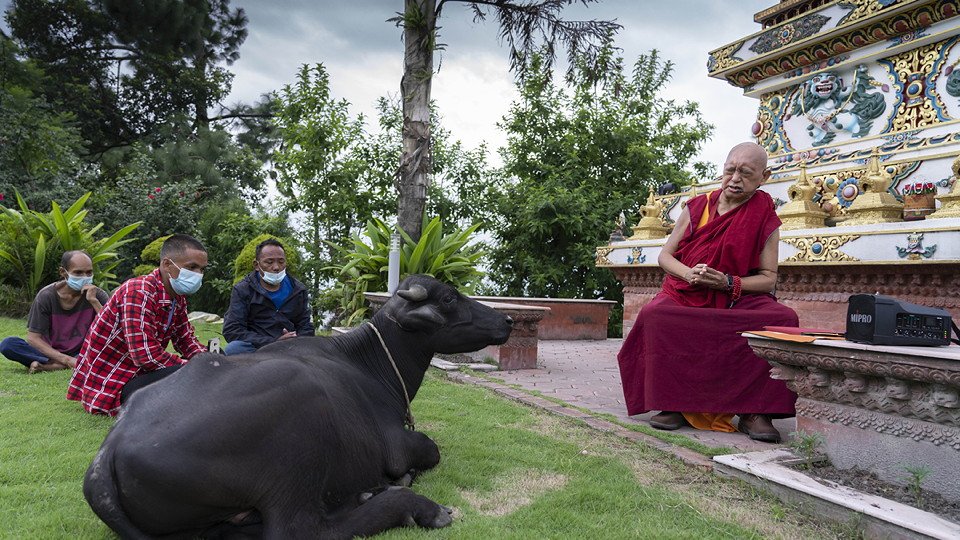
Lama Zopa Rinpoche and a young buffalo that he liberated, Kopan Monastery, Nepal, August 2021. Photo by Ven. Lobsang Sherab.
Last month we shared a report on recent beneficial activities supported by the Animal Liberation Fund. In this report we updated on a buffalo named Bodhichitta, a buffalo blessed by Lama Zopa Rinpoche in 2021. Today we are re-sharing a video of that blessing and Rinpoche personally sharing the story of how he came into contact with this special animal.
Please watch this touching video:
https://youtu.be/9sbZm1Xk_5M
Bodhichitta the buffalo is now thriving at the Animal Liberation Sanctuary at Kopan Monastery in Nepal, enjoying daily life surrounded by care and love.
Please read the full story of this buffalo, in Rinpoche’s words, from 2021.
There are many resources available for those wishing to benefit animals, including advice from Lama Zopa Rinpoche and links to practices and materials:
https://fpmt.org/education/prayers-and-practice-materials/benefiting-animals-practices-and-advice/
All are welcome to contribute to the Animal Liberation Fund to help ensure that our work sponsoring animal rescue, care, and liberation continues.
2
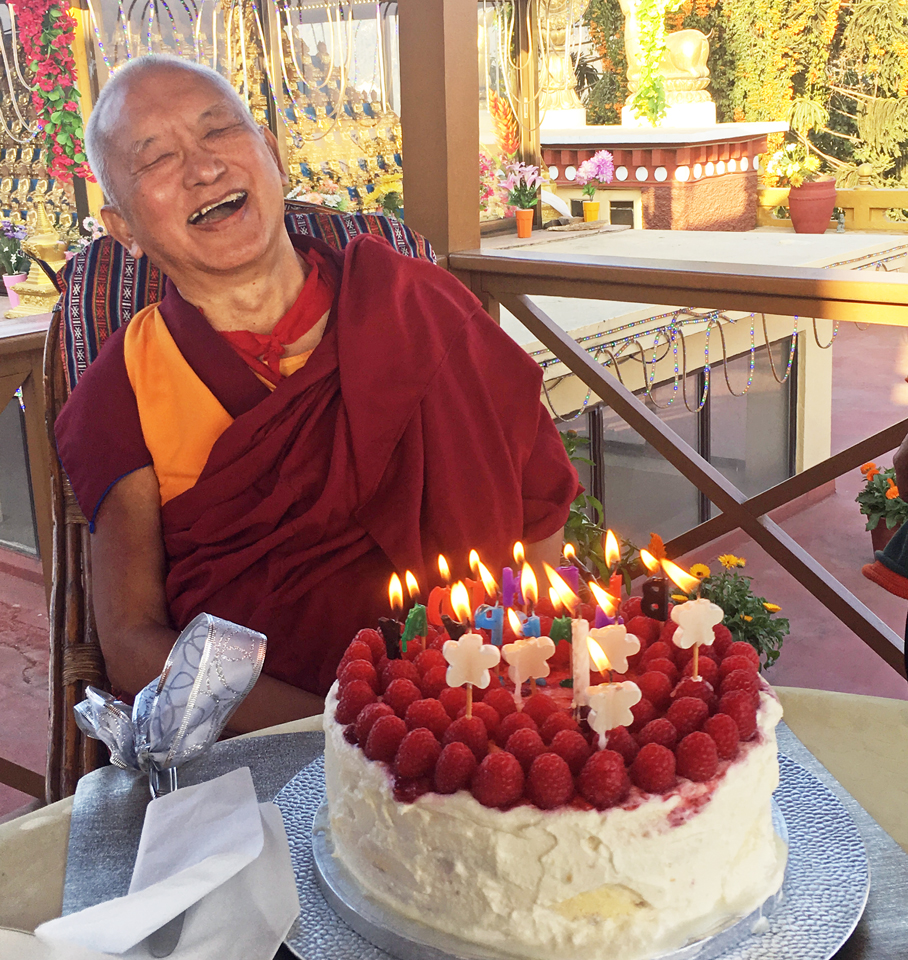
Lama Zopa Rinpoche with a birthday cake offered to him, Kopan Monastery, Nepal, 2016.
On December 3 we observe the birth date of Lama Zopa Rinpoche. As previously shared, a very large thangka of Padmasambhava (Guru Rinpoche) will be displayed and an auspicious 100,000 tsog offering event (Guru Bumtsog) will take place at Khachoe Ghakyil Ling (Kopan Nunnery) on this date in honor of Lama Zopa Rinpoche’s birthday, to commemorate Rinpoche’s life and fulfill Rinpoche’s wishes.
The event will start early in the morning of December 3, local time in Nepal, at approximately 8 a.m. and will be presided over by H.E. Jangtse Choeje Kyabje Gosok Rinpoche of Sera Mey Monastery.
Students of Lama Zopa Rinpoche are encouraged to rejoice in this auspicious and powerful event and to pray for the swift return of his reincarnation as advised by His Holiness the Dalai Lama. Please also dedicate for all of Rinpoche’s wishes to manifest without delay, and for the success of the FPMT organization.
Please read more about the large Padmasambhava thangka display and the Guru Bumtsog taking place at Kopan Nunnery:
https://fpmt.org/lama-zopa-rinpoche-news-and-advice/large-padmasambhava-thangka-display-and-guru-bumtsog-offered-on-lama-zopa-rinpoches-birthday/
Lama Zopa Rinpoche (1945-2023) was the spiritual director of the Foundation for the Preservation of Mahayana Tradition (FPMT), a Tibetan Buddhist organization dedicated to the transmission of the Mahayana Buddhist tradition and values worldwide through teaching, meditation and community service.
- Tagged: lama zopa birthday
27
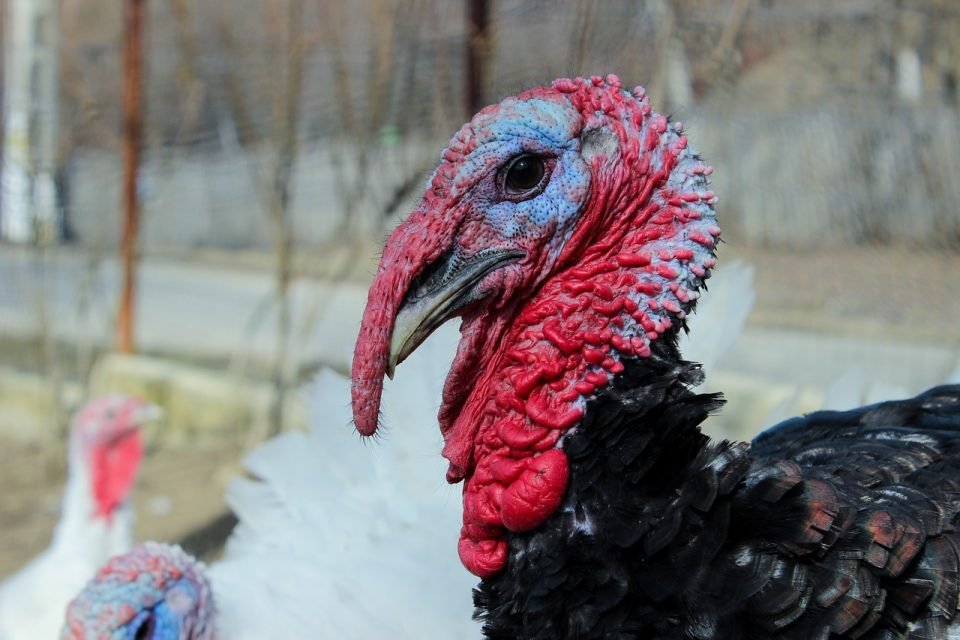
Turkeys at a farm. Photo courtesy of Pixabay.
Every year in the United States, tens of millions of turkeys are killed for the holiday of Thanksgiving, which is this Thursday, November 28, 2024. Lama Zopa Rinpoche offered advice in a 2018 teaching to help benefit the turkeys killed, and how we can think during the holiday. Rinpoche explained that these practices can be applied beyond the Thanksgiving holiday, “These are simple methods, but they have unbelievably profound benefits, like the sky. You can also do more or different practices as well. These are just suggestions. You can also do these practices at Christmas or on other occasions where turkeys and so many other animals are sacrificed and eaten.”
In “Prayers and Practices to Do for Turkeys at Thanksgiving”, Rinpoche explains,
“If you are Buddhist, or just someone who does not want to suffer now or in endless future lives as well, having to experience unbelievably suffering, you need to purify your past negative karma and stop creating any more so that you will not be reborn as a turkey over and over again. … If you do have to eat turkey because of some family obligation, then at least do some mantras and prayers to benefit the turkeys, such as the four immeasurables with tonglen. Otherwise, if you just enjoy eating turkey together with the rest of the Americans who are not Buddhist, who do not know Dharma, who have not generated compassion for the turkeys, you create much negative karma.”
In this teaching Rinpoche provides detailed instructions on practices to purify negative karma, such as Vajrasattva, taking the eight Mahayana precepts, reciting sutras, engaging in nyung ne fasting retreats, generating love and compassion through the practice of tonglen and the Four Immeasureables, practicing Chenrezig, Medicine Buddha puja and specific mantras. Rinpoche also offers a special dedication to purify any negative karma that could cause future rebirth as a turkey.
Of course, Rinpoche also has given extensive advice for benefiting animals and we invite you to explore all the resources available to you.
For links to practice materials in these detailed instructions, we invite you to read “Prayers and Practices to Do for Turkeys at Thanksgiving”. Included on the page is an additional short teaching from Rinpoche which we include below:
Further Commentary and Advice for Thanksgiving from Lama Zopa Rinpoche:
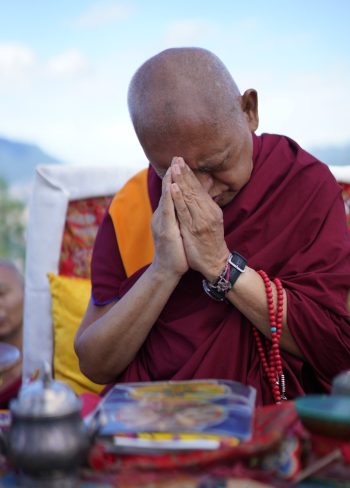
Lama Zopa Rinpoche, Kopan Monastery, 2020. Photo by Ven. Lobsang Sherab.
I don’t think the general population of America accepts clairvoyance, but if it did, people would understand where all the sufferings, such as depression, come from. The way people normally think—for example, what causes depression—is very limited. They only think about things that are to do with this life. If they had clairvoyance they could see much deeper; they could see things such as past and future lives. People normally think of only this life, not past and future lives.
In the past, many of the turkeys that Americans are eating were Americans who in the past had killed turkeys. Often it could even be a past family member that they are now eating.
There’s a sutra story about Buddha’s disciple Shariputra, who excelled in wisdom. Once when he was on his alms round he looked into a family’s house and saw that the father, who used to catch fish in his backyard pond, had died and been reborn as a fish in that pond. The mother, his wife, who had been very attached to the home, had also died and been reborn as the family dog. And the son’s enemy, who had been very attached to the son’s wife, had died and been reborn as their child. The son was holding the child, his former enemy, eating the fish, his late father, and beating the dog, his late mother, while it chewed on fish bones. Shariputra then observed, “The son is eating his father’s flesh, beating his mother with a stick, and cuddling his enemy on his lap—samsaric existence makes me laugh.”
If we have animals we have to remember this story and take care of them well. It is very important to understand the benefits of taking care of our pets and other animals by giving them food and drink. Think that you are making charity and don’t just do it out of attachment, thinking that you love the shape of the animals or something, doing everything simply for your own happiness. It’s the same with looking after your children. You create a child with attachment, for your own happiness, thinking how your life would be unbelievably happy if you had a child. Then you take care of the child, but it is for your own happiness.
It is also important to recognize and remember your animals’ most unbelievable kindness, how they have been kind to you in three ways, and then with that awareness give them food and drink. First recite OṂ MAṆI PADME HŪṂ and then blow over the food and drink to bless it. If you have mani pills, it’s good to crush them and put them into the food and drink, or even add blessed water. You don’t have to get blessed water from a lama; you can make it yourself. Whether or not you have daily commitments, recite OṂ MAṆI PADME HŪṂ and other mantras, such as OṂ PADMO UṢHṆĪṢHA VIMALE HŪṂ PHAṬ, the Mitrugpa mantra and so forth, and then blow on the water. You can recite however many repetitions of each mantra you want, like seven, ten, fifteen, or more, blow on the animal’s food or water and make prayers as well. Similarly, you can keep a bottle of water nearby and when you’ve done your commitments you can blow on the water and then use that to put on the food and water that you give to the animals.
Then make this dedication prayer:
Due to all the past, present, and future merits collected by me and all the merits of the three times collected by numberless buddhas and numberless sentient beings, may all these animals (you can also include your family members, especially your father and mother) never ever get reborn back into the lower realms but be reborn in a pure land where they can achieve enlightenment, or, if not, at least receive a perfect human body, meet the Mahayana teachings, and a perfectly qualified guru revealing the unmistaken path to enlightenment, and by pleasing the holy mind of the virtuous friend may they attain enlightenment as quickly as possible.
Finally, please remember the unbelievable benefits of making charity of food to the animals. As the Buddha said, “Anybody who makes charity well during the period my teachings exist will receive great enjoyments for 80,000 eons, even if the material that person offers is merely the size of a hair. That person will be free from pain and disease, will enjoy great happiness, will be enriched with all manner of desirable things, and will eventually achieve the result: peerless cessation and complete enlightenment.”
This advice has been extracted from the page “Prayers and Practices to Do for Turkeys at Thanksgiving,” which shares a teaching and advice given by Lama Zopa Rinpoche in Switzerland in 2018. Scribed by Holly Ansett. Edited by Nicholas Ribush, November 2020.
For more mantras and resources for mantra recitation, visit FPMT Education Services’ page on mantras. You can find a full catalogue of all FPMT prayers, practices, and advice materials on FPMT.org.
Foundation for the Preservation of Mahayana Tradition (FPMT), is a Tibetan Buddhist organization dedicated to the transmission of the Mahayana Buddhist tradition and values worldwide through teaching, meditation and community service.
- Tagged: thanksgiving
26
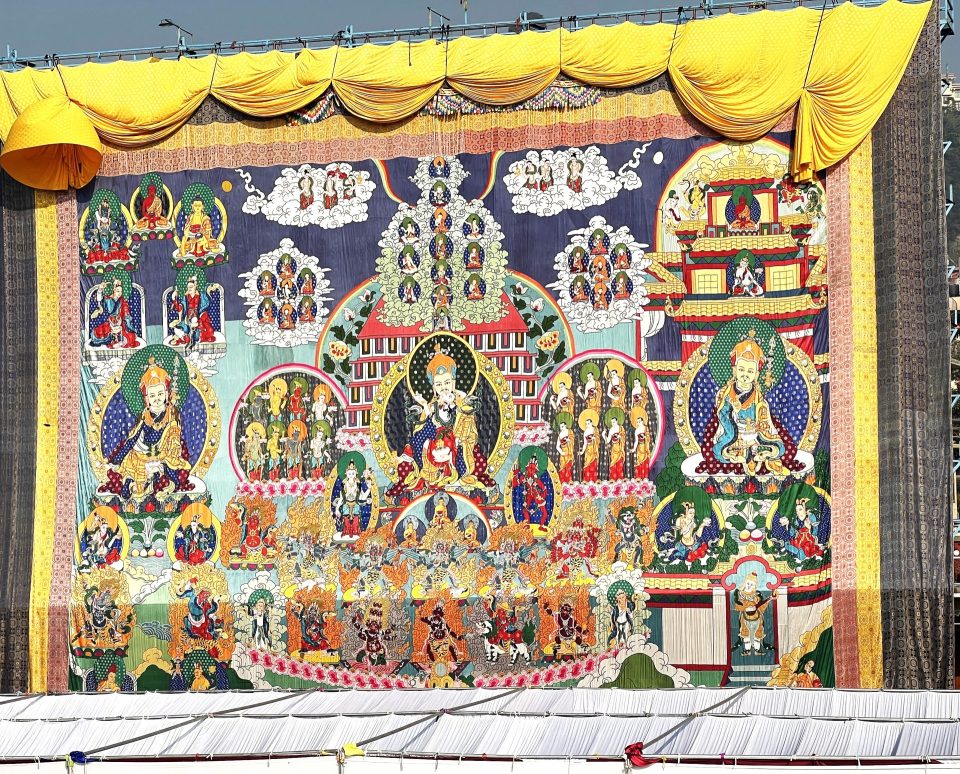
Large Thangka display and Guru Bumtsog at Kopan Nunnery, 2023. Photo by Ven. Roger Kunsang.
For the ninth year in a row, a very large thangka of Padmasambhava (Guru Rinpoche) will be displayed and an auspicious 100,000 tsog offering event (Guru Bumtsog) will take place at Khachoe Ghakyil Ling (Kopan Nunnery). This yearly event now takes place in honor of Kyabje Lama Zopa Rinpoche’s birthday, December 3, to commemorate Rinpoche’s life and fulfill Rinpoche’s wishes. Students of Rinpoche are encouraged to attend this extremely joyous annual event when one is able. The event will start early in the morning of December 3, local time in Nepal, at approximately 8 a.m. and will be presided over by H.E. Jangtse Choeje Kyabje Gosok Rinpoche of Sera Mey Monastery.
The thangka, which is 75 feet (23 meters) high and 87 feet (27 meters) wide, depicts in stitched appliqué the Padmasambhava merit field in the center. Lama Zopa Rinpoche personally designed and oversaw the creation of this huge thangka and also raised the funds for it, thanks to the kindness of two generous donors. The thangkha was also blessed by His Holiness the Dalai Lama. The incredible weight of the thangka and raising it safely up large scaffolding to display requires tremendous skill and effort. The puja is an incredible undertaking by Kopan monks and nuns as it takes days to set up and arrange, plus lunch offered to all in attendance requires major preparation.
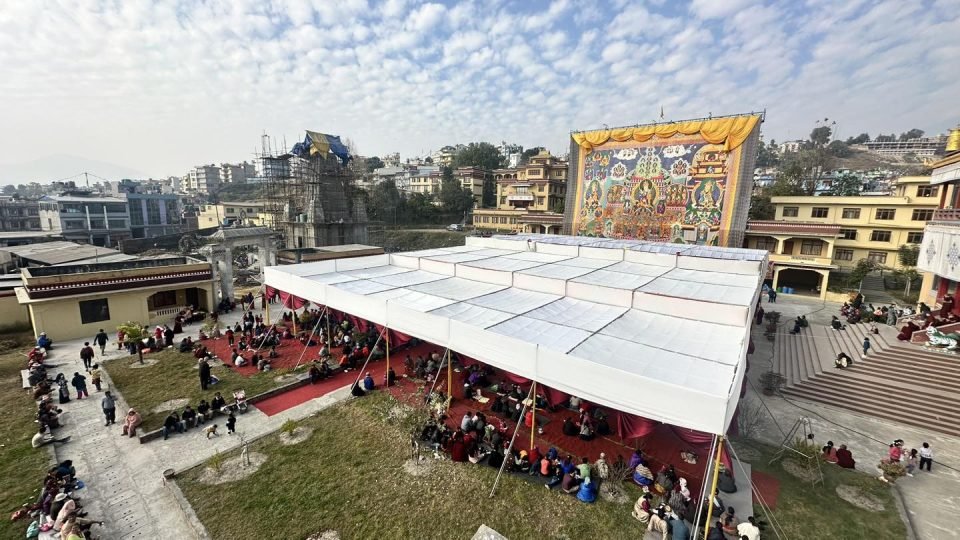
Guru Bumtsog event with the large Padmasambhava thangka on display, December 16, 2023. Photo courtesy of Kopan Monastery.
Ven. Sarah Thresher shares, “The text used [in the Guru Bumtsog] is the Sadhana of the Lineage of Awareness-Holders from the Northern Treasures cycle revealed by the great treasure-finder Rigdzin Godem. It is the same text used for Guru Bumtsog at His Holiness Dalai Lama’s temple each year and it has been translated by Bia Bispo. For those of you who are not aware, the Northern Treasures are widely practiced in Khumbu Thamichowa and this was the main lineage held by the first Lawudo Lama. So it is a wonderful opportunity to pray for a new unmistaken manifestation of the Lawudo Lama to swiftly return in magnificence!”
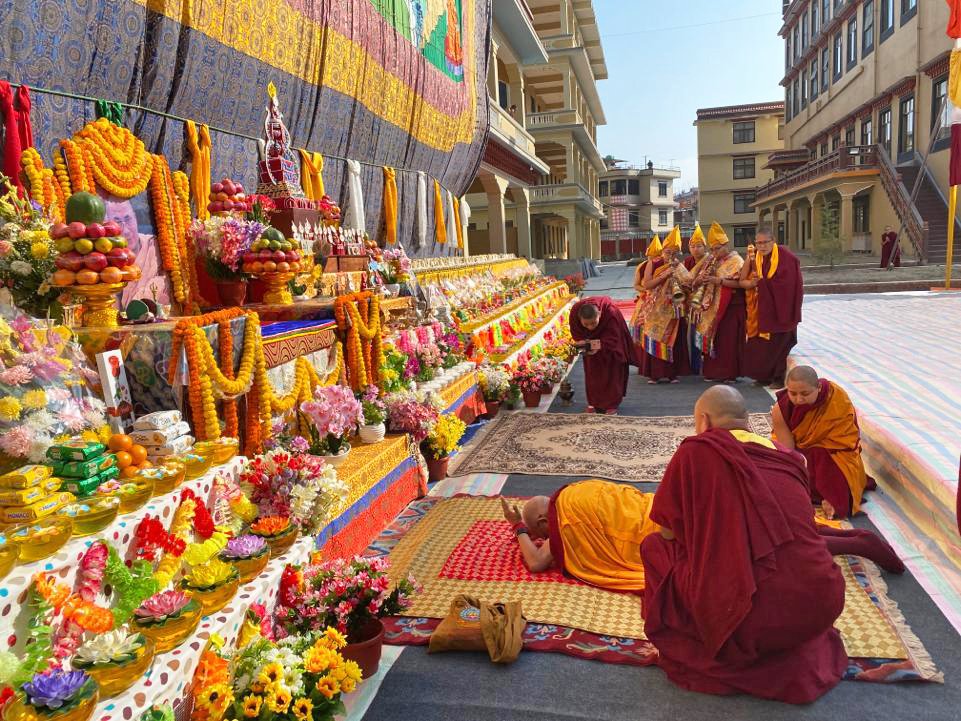
Lama Zopa Rinpoche prostrating to the giant Guru Rinpoche thangka during the Guru bumtsok at Khachoe Ghakyil Nunnery, January 2020.
Lama Zopa Rinpoche explained that displaying large thangkas is an auspicious way for anyone in the area to make a Dharma imprint and connection to the deity depicted. “You may think that a statue or thangka is just a statue or thangka,” Rinpoche has said, “but it is the transcendental wisdom of dharmakaya, which understands and directly sees absolute truth, as well as conventional truth.”
Rinpoche also expressed that it is his wish for many FPMT centers to have huge thangkas and once a year to display the thangka and have a festival day for the public based around the holy object. During the festival day, Rinpoche requested for there to be many thousands of offerings in front of the thangka, as well as offering banners.
Students of Lama Zopa Rinpoche are encouraged to rejoice in these events occurring on December 3 as a way to honor Rinpoche’s extremely beneficial and inspiring life, and to dedicate the merit for the swift return of his unmistaken reincarnation. Students are also reminded of the practices advised by His Holiness the Dalai Lama. All swift return prayers have been compiled for ease of use.
Please rejoice in this auspicious yearly event which is fulfilling Lama Zopa Rinpoche’s Vast Visions for the FPMT organization, and has profound effects on those in Nepal and the entire world. The costs of offering this yearly event are substantial and will be covered this year by two very kind benefactors.
The Puja Fund was established by Lama Zopa Rinpoche to provide resources for continuous pujas dedicated to the long life of His Holiness the Dalai Lama and to the success of all the FPMT centers, projects, services, students, benefactors and those serving the organization in any way.
24
This eulogy is also available to read on our website with translations into several languages.
Here we share on chapter from this beautiful tribute, describing Rinpoche’s early life:
“That Is My Home!”
Lama Thubten Zopa Rinpoche was born at sunrise on December 3, 1945, the last day of the tenth month of the Wood Bird year in the Tibetan lunar calendar, in Thangme, a village in the Khumbu region of Nepal, up in the Himalayas.
It was evident from the time he was two or three years old that he knew what he wanted. One of many children of a Sherpa family — he was called Dawa Chötor then — the moment his mother, Yangchen, turned her back, fetching water, checking on the potato fields, or collecting wood, he’d be gone, determinedly trudging his way up the long, steep, winding path that led to the cave of the Lawudo Lama, the revered local yogi Kunsang Yeshe who’d died a couple of years earlier.
They’d find him asleep in the resting place halfway up the mountain, his sister Ngawang Samten said. When they’d admonish him to “come home!” he’d point up towards the cave and say, “No, that is my home!”
Ani Samten said that somehow he was different from the other children, sitting apart, or sitting on a high box when he ate his meals. And when he’d play games, he’d always play the role of the lama: he’d lead pujas, give initiations, and announce the names of the Lawudo Lama’s benefactors, saying they’d be coming.
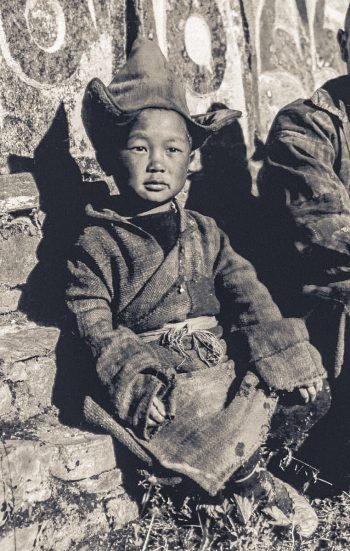
Lama Zopa Rinpoche as a child in Rolwaling. Photo by Tom Weir
When he was three, Rinpoche was delighted when the Lawudo Lama’s attendant, Ngawang Chöpel, came to visit. He cried and cried when he was leaving, declaring that he must go with him. Although soon recognized as the unmistaken reincarnation by many lamas, including the beloved local lama, Trulshik Rinpoche, it wasn’t until years later that the family of Lama Kunsang Yeshe, who was a lay yogi, accepted.
When he was five he was sent over the mountains to Rolwaling, west of Khumbu, to be educated by one of his uncles.
It was here, in 1952, that he first laid eyes on people with “white eyes and yellow hair,” as the Sherpas described Westerners, a group of them camping in a meadow on the other side of the river. Eager to meet them, he crossed the river on the makeshift bridge but fell into the water with his gift of boiled potatoes before reaching the other side. Rinpoche recounted later that while he was struggling to keep his head above water the thought occurred to him that the person known as the Lawudo Lama was about to die, but although he didn’t know anything about emptiness, “there was no fear.”
You can read the full eulogy written by Ven. Robina online, or download the newly available PDF for mobile phones and tablets.
Lama Zopa Rinpoche (1945-2023) was the spiritual director of the Foundation for the Preservation of Mahayana Tradition (FPMT), a Tibetan Buddhist organization dedicated to the transmission of the Mahayana Buddhist tradition and values worldwide through teaching, meditation and community service.
- Tagged: lama zopa rinpoche obituary
1
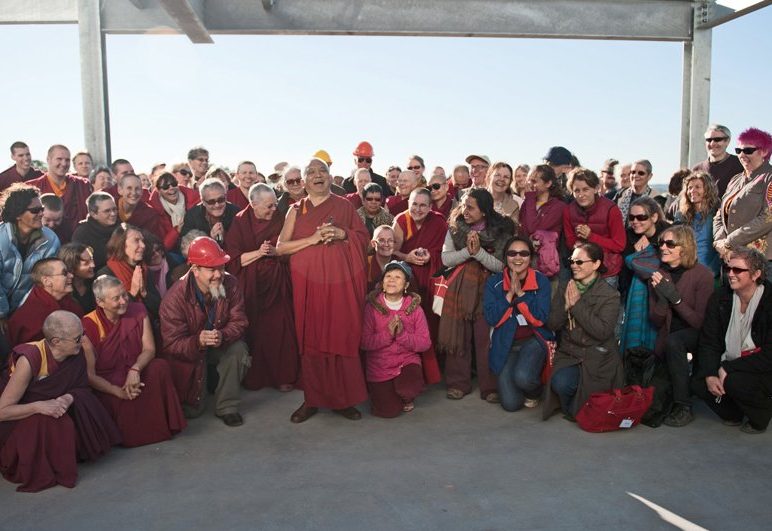
Lama Zopa Rinpoche and students participating in the retreat at the Great Stupa of Universal Compassion, Australia, April 2011. Photo by George Manos.
Recently we reminded students about three teaching events Lama Zopa Rinpoche offered on Bodhicaryavatara (A Guide to the Bodhisattva’s Way of Life) and Rinjung Gyatsa Retreat at the Great Stupa of Universal Compassion in Bendigo, Australia. These events occurred in 2011, 2014, and 2018, and are all available on our Rinpoche Available Now page.
That first retreat, attended by over 200 students, was referred to as a “retreat of a lifetime” by many of the participants. This retreat is also remembered as the time when Rinpoche manifested the symptoms of a stroke.
“This became an intense teaching on so many levels for all of us, whether we were physically present at the retreat or back in our daily lives. The importance of making your life meaningful is resonating in my mind and how we really need to put effort into transforming our minds,” Helen Patrin told Mandala at the time.
Ven. Thubten Kunsang, the French monk who until his death in 2016 recorded Rinpoche’s teachings, created short videos of the 2011 retreat. One of these videos shares many scenes with Rinpoche, including showing the open structure of the Great Stupa, where the teachings were held, before the Stupa’s exterior was complete. Other scenes include Rinpoche blessing insects, talking about the Mani caps, doing preta practice, and discussing the Namgyalma mantra. The video concludes with Rinpoche reminding us how our lives are all a hallucination. Please enjoy this short video, which contains so many joyful snippets of Rinpoche using every moment to benefit and inspire others:
For more information on the 2011 retreat, written after it occurred, read: “The Retreat of a Lifetime: Guru Devotion in Australia with Lama Zopa Rinpoche” and “When the Guru Manifests a Stroke: Ordinary Appearances and Extraordinary Teachings from Lama Zopa Rinpoche” from Mandala July-September 2011.
2011 Bodhicaryavatara (A Guide to the Bodhisattva’s Way of Life) and Rinjung Gyatsa Retreat in Australia is available to watch on our Rinpoche Available Now page, as are the 2014 and 2018 retreats.
Lama Zopa Rinpoche (1945-2023) was the spiritual director of the Foundation for the Preservation of Mahayana Tradition (FPMT), a Tibetan Buddhist organization dedicated to the transmission of the Mahayana Buddhist tradition and values worldwide through teaching, meditation and community service.
- Tagged: a guide to the bodhisattva's way of life, australia retreat 2011, bendigo, great stupa of universal compassion
20
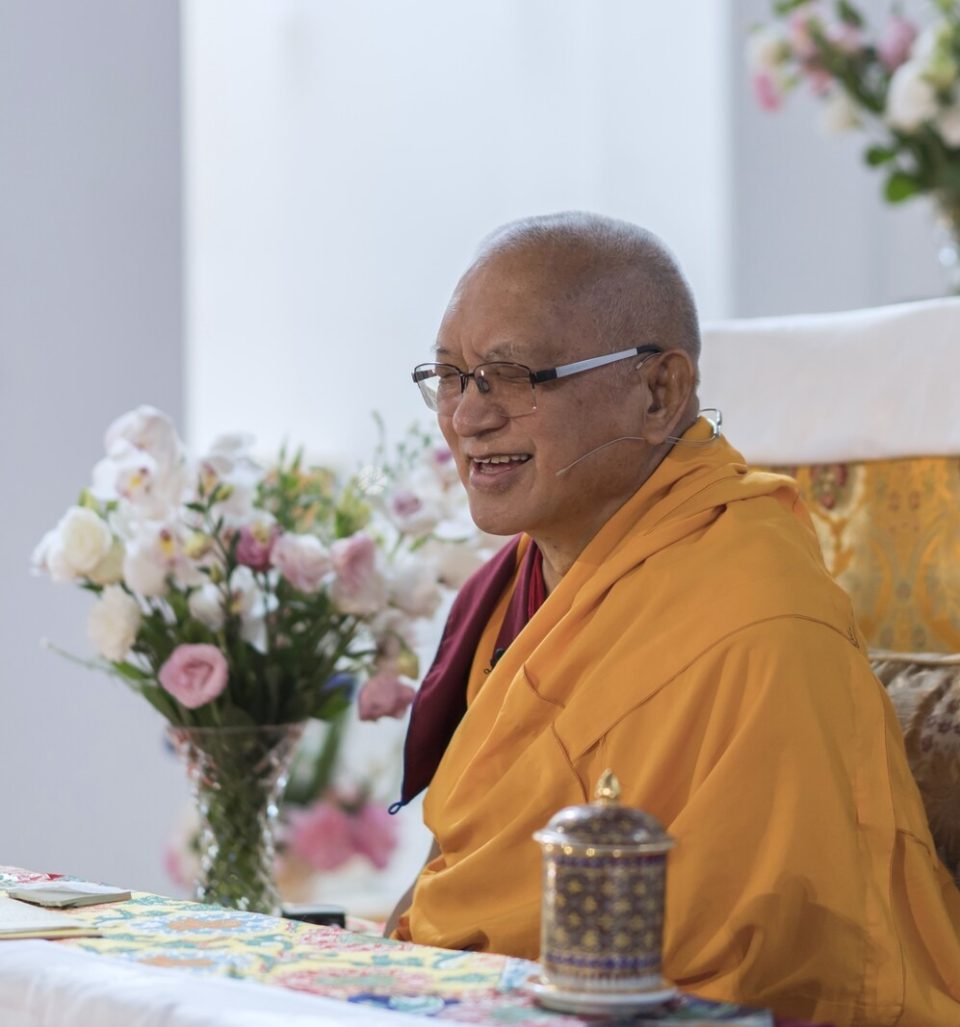
Lama Zopa Rinpoche teaching at the Great Stupa of Universal Compassion, Bendigo, AUS, April 3, 2018. Photo by Ven. Lobsang Sherab.
FPMT.org’s Rinpoche Available Now page is an incredibly rich resource for those wishing to explore full teaching events offered by Lama Zopa Rinpoche over the years.
In 2018 Lama Zopa Rinpoche spent six weeks leading the Bodhicaryavatara (A Guide to the Bodhisattva’s Way of Life) and Rinjung Gyatsa Retreat at the Great Stupa of Universal Compassion in Bendigo, Australia, offering more than sixty teachings. This was the third time Rinpoche offered this retreat series at the Great Stupa of Universal Compassion.
In early April 2011, Lama Zopa Rinpoche began teaching this retreat series, co-hosted by the Great Stupa, Atisha Centre, and Thubten Shedrup Ling Monastery, and attended by nearly 200 students, Rinpoche taught for about ten days before manifesting the symptoms of a stroke.
The first teachings in this series from 2011 are also available on the Rinpoche Available Now page. Rinpoche continued his retreat series at the Great Stupa in September-October 2014 (also available on the Rinpoche Available Now page) and in April-May 2018 (referenced here), and was scheduled to lead the March-April 2020 retreat, which was postponed due to the pandemic.
Video recordings of these teachings from 2018 are available, as well as additional teachings from this time at Chag-tong Chen-Tong Centre and Chenrezig Institute on our Rinpoche Available Now page. In addition to video recordings, unedited transcripts and audio files from these teachings are also made available for each teaching event.
Today we are sharing the video teaching, “Only Solution to Problems is to Practice Dharma and Subdue the Mind,” given on April 2, 2018 at the Great Stupa of Universal Compassion.
In this teaching Rinpoche stresses that we have experienced problems since beginningless rebirths and if we don’t practice Dharma in this life and actualize the path, these problems will just continue. Most of us only practice Dharma after everything else, and Dharma gets left out when we don’t have time. However, practicing Dharma is the most important thing, otherwise problems never finish. Thus, the only solution is to practice Dharma. To take care of oneself means not only taking care of the body, but subduing the mind. In fact, the best way to take care of the body is to take care of the mind. Practicing Dharma is to take care of oneself, but additionally to take care of the numberless sentient beings who are just like yourself, with bodhichitta. This is the most important.
Watch “Only Solution to Problems is to Practice Dharma and Subdue the Mind”:
2011 Bodhicaryavatara (A Guide to the Bodhisattva’s Way of Life) and Rinjung Gyatsa Retreat in Australia can be viewed here:
https://fpmt.org/media/streaming/teachings-of-lama-zopa-rinpoche/lama-zopa-rinpoche-teachings-in-bendigo-australia-2011/
2014 can be viewed here:
https://fpmt.org/media/streaming/teachings-of-lama-zopa-rinpoche/lama-zopa-rinpoche-teachings-in-australia/
2018 can be viewed here:
https://fpmt.org/media/streaming/teachings-of-lama-zopa-rinpoche/lama-zopa-rinpoche-teachings-in-bendigo-2018/
Lama Zopa Rinpoche (1945-2023) was the spiritual director of the Foundation for the Preservation of Mahayana Tradition (FPMT), a Tibetan Buddhist organization dedicated to the transmission of the Mahayana Buddhist tradition and values worldwide through teaching, meditation and community service.
- Tagged: advice from lama zopa rinpoche, bendigo, great stupa of universal compassion, rinpoche available now
12
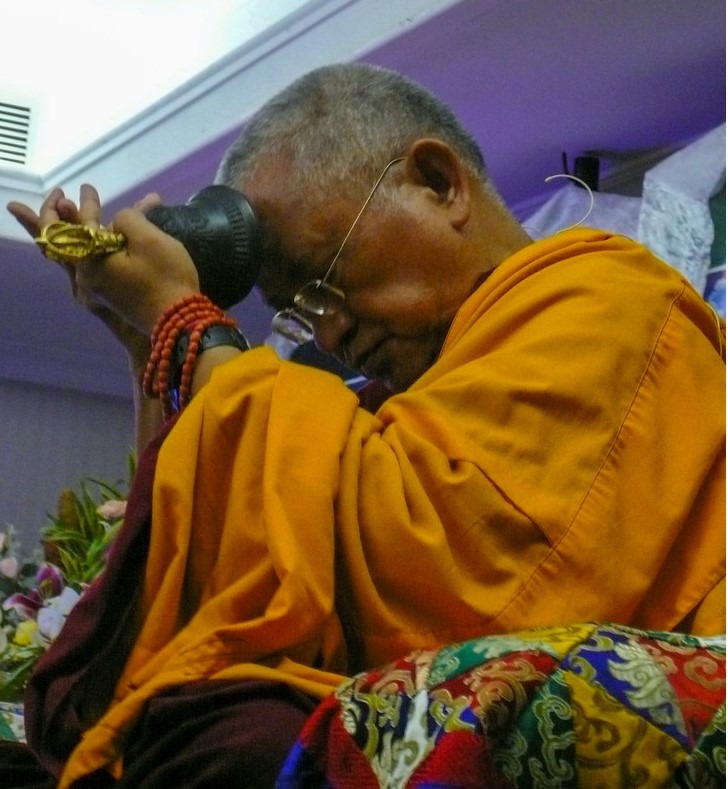
Lama Zopa Rinpoche, January 25, 2010, Indonesia.
From January 25 through February 7, 2010, Lama Zopa Rinpoche granted 12 sessions of teachings at Potowa Center in Indonesia. These teachings provided a comprehensive overview of key Buddhist concepts, focusing on how to integrate them into daily practice to progress on the path to enlightenment. We are pleased to share that all 12 videos from this event are now available on our RAN page.
Today, we are sharing the first video of these teachings, “The Urgent Need to Realize Emptiness.”
In this teaching, Rinpoche offered a commentary on the practice of Lama Chopa (Guru Puja).
Watch, “The Urgent Need to Realize Emptiness”
As a reminder, all of these sessions are now available for students to explore as they wish. On this page, you can also find a full combined transcript of these teachings, more information about the sessions, and MP3 audio download.
Foundation for the Preservation of Mahayana Tradition (FPMT), is a Tibetan Buddhist organization dedicated to the transmission of the Mahayana Buddhist tradition and values worldwide through teaching, meditation and community service.
5
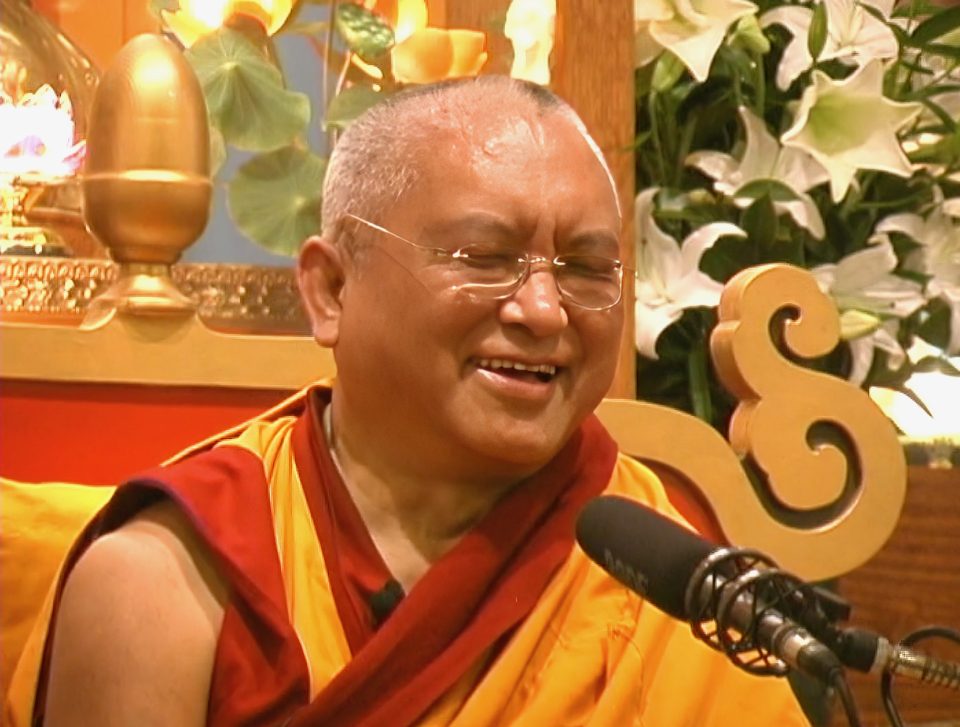
Lama Zopa Rinpoche teaching in Australia, June 2, 2006.
We were so pleased to recently make available, via video, teachings by Lama Zopa Rinpoche at Langri Tangpa Center, Brisbane, Australia from June 16-18, 2006. These four sessions of profound teachings are on the Eight Verses of Mind Training, a classic Tibetan Buddhist text by Kadampa Geshe Langri Tangpa, and offer deep insights into Buddhist philosophy and practice. Rinpoche covers a wide range of topics, including:
- The nature of emptiness and dependent arising
- How to recognize and refute the false view of inherent existence
- The importance of guru devotion on the spiritual path
- Developing bodhichitta, the altruistic intention to benefit all beings
- Practical advice on transforming daily activities into meaningful spiritual practice
As we announced previously, all four videos from this event are now available on our RAN page.
Today we are drawing your attention to the third video in this series, “Emptiness, Dependent Arising, and Overcoming Delusions.” In this session, held on June 18, 2006, Rinpoche delves deeper into the concept of emptiness, explaining how all phenomena, including the self, are empty of inherent existence. He emphasizes that everything exists as mere labels imputed by the mind, dependent on valid bases. Rinpoche discusses how recognizing this can help overcome delusions like anger and attachment, and alleviate depression. He uses everyday examples to illustrate these profound concepts, making them more accessible to the audience.
Watch, “3 Emptiness, Dependent Arising, and Overcoming Delusions”
https://www.youtube.com/watch?v=KXnp7vYOvnQ
As a reminder, all of these sessions are now available for students to explore as they wish.
Foundation for the Preservation of Mahayana Tradition (FPMT), is a Tibetan Buddhist organization dedicated to the transmission of the Mahayana Buddhist tradition and values worldwide through teaching, meditation and community service.
23
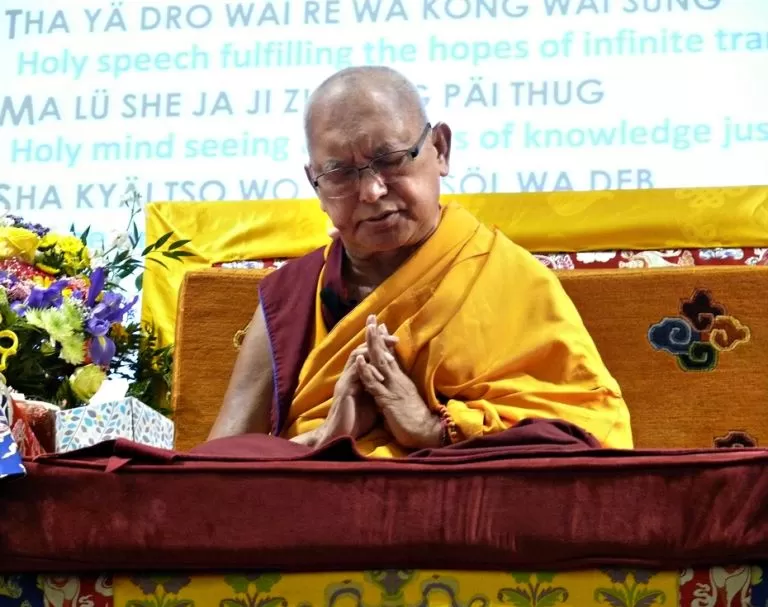
Lama Zopa Rinpoche at Light of the Path, Black Mountain, North Carolina, US, September 2017. Photo by Kalleen Mortensen.
As students of Lama Zopa Rinpoche, we are unbelievably blessed by the vastness of beneficial teachings left for us over decades, and in a wide variety of formats. We thought to bring your attention to one resource available to you, the Lama Zopa Rinpoche Essential Extracts page.
The essence of Lama Zopa Rinpoche’s teachings are extracted into stand-alone short videos focused on a specific topic. Most of these Essential Extract videos are available both as video only and also as video with transcript overlay.
Today we share one of these extracts, in which Rinpoche answers the following question from a student in the audience during the 2017 Light of the Path Retreat in North Carolina:
If you have a partner who is drowning at sea and there is somebody else exactly the same distance, who would you choose to help?
Find out how Rinpoche answered this question, in this short 6 minute extract:
Help All Beings without Discrimination
View the entire large collection of Essential Extracts.
Additionally, please explore the Essential Extracts Podcast, which features edited and condensed versions of these videos. Each fifteen to thirty minute episode focuses on a single topic, and includes edited and condensed audio extracts from longer teachings by Rinpoche. The Essential Extracts Podcast is available through popular podcasting apps and platforms, such as Apple Podcasts, Audible, Google Podcasts, Spotify, Overcast, Pocket Cast, and so forth. To find the show in a podcast app, search for the series title “Lama Zopa Rinpoche Essential Extracts.”
Lama Zopa Rinpoche (1945-2023) was the spiritual director of the Foundation for the Preservation of Mahayana Tradition (FPMT), a Tibetan Buddhist organization dedicated to the transmission of the Mahayana Buddhist tradition and values worldwide through teaching, meditation and community service.
- Tagged: discrimination, Essential Extracts
9
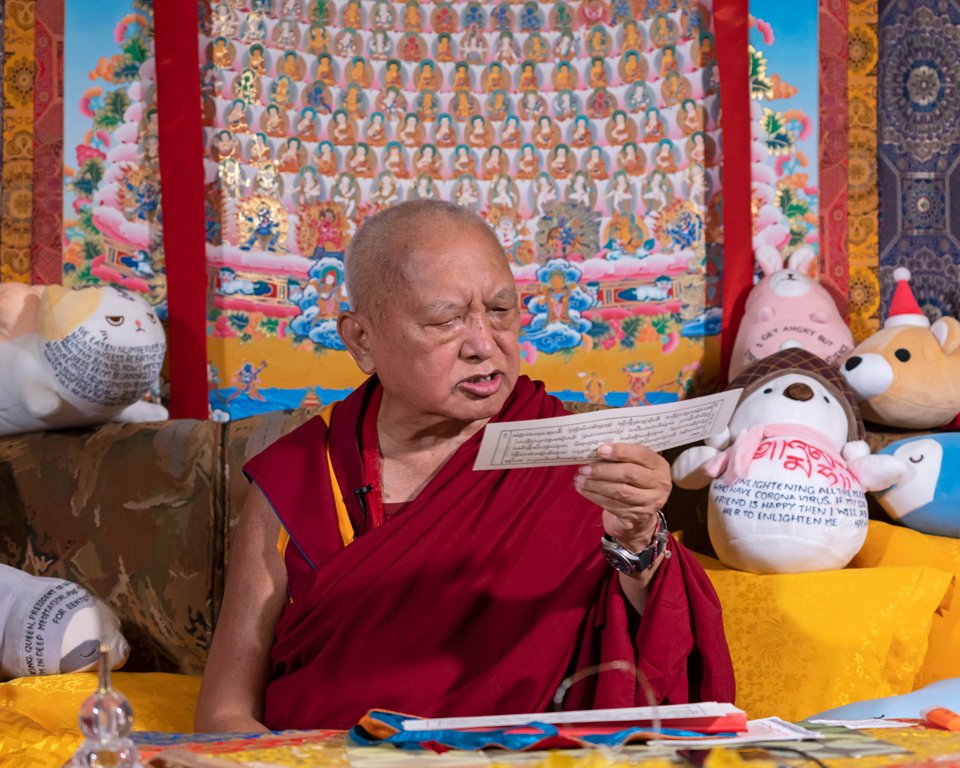
Lama Zopa Rinpoche giving the oral transmission of the Sutra of Great Liberation, Kopan Monastery, Nepal, March 2021. Photo by Ven. Lobsang Sherab.
Last year we shared the news that the Sutra of Great Liberation, a sutra which Lama Zopa Rinpoche stressed the inconceivable benefits of engaging with, had been translated into English by Ven. Gyalten Lekden of Sera Je Monastery. Today we are reminding you of this important sutra with the wish that all who have an interest will engage with it.
Rinpoche is reported to have spoken of the Sutra of Great Liberation as early as 2006, though it was especially in the later years of his teachings that Rinpoche began commenting on this sutra regularly. In 2020 Rinpoche asked Ven. Gyalten Lekden to translate this important sutra so that many people can read it in English explaining, “It is great to translate this, unbelievable. So many people can read it. Because most people can’t read Tibetan, they have to read English. Then they liberate so many sentient beings from lower realms, lower nirvana, and samsara, and they achieve enlightenment. It has unbelievable benefits if we translate it.”
The Sutra of Great Liberation is formally entitled, The Arya Mahayana Sutra Called “Arya All-Expansive Great Liberation, Purifying Negative Deeds through Cleansing Remorse, Perfectly Arranged Accomplishment of Buddhahood.” The Tibetan text, found in the Kangyur, is a translation of the Chinese rendition, the Sanskrit source text having been lost over the course of time.
Rinpoche has stressed the importance of this sutra, expounding on its benefits and giving the oral transmission of it, during the extensive series of thought transformation teachings given at Kopan Monastery.
Rinpoche emphasized that engaging with this sutra in any way, even unintentionally, has “unimaginable benefits.” He said that anyone who hears even the name of the sutra, writes, reads, prints, or keeps a copy of it collects unimaginable merit. Reciting it is an easy method to purify all the very negative karmas. Furthermore, anyone who memorizes, holds, or keeps a copy of it will become free from suffering, will never be reborn in the lower realms, and will become enlightened. The same is true for anyone who simply hears its powerful mantra. You can access the mantra from the Sutra of Great Liberation in PDF and audio formats; and also learn more about it.
Because of these benefits, Rinpoche recommended that we recite the sutra when we are able, and that it would even be beneficial to “keep the sutra.” Rinpoche noted, wherever a copy of this sutra is kept, this is a place where the Buddha himself resides.
Get the Sutra of Great Liberation in English:
shop.fpmt.org/the-sutra-of-great-liberation-ebook-pdf.html
Get the Tibetan pecha of the Sutra of Great Liberation (for printing):
shop.fpmt.org/Tibetan-Pecha-of-the-Sutra-of-Great-Liberation-PDF_p_3567.html
The oral transmission and commentary of the Sutra of Great Liberation can be found:
fpmt.org/tag/sutra-of-great-liberation
Newly available materials:
Sutra of Great Liberation MP3 Download:
shop.fpmt.org/Sutra-
The Sutra of Great Liberation in Russian:
shop.fpmt.org/The-
Please also note that The Sutra of Great Liberation is available as a Print on Demand on Amazon in various countries, so please check your local Amazon site if you are interested in a printed copy.
Through comprehensive study programs and practice materials, FPMT Education Services nourishes the development of compassion, wisdom, kindness, and true happiness in individuals of all ages.
- Tagged: sutra of great liberation
6
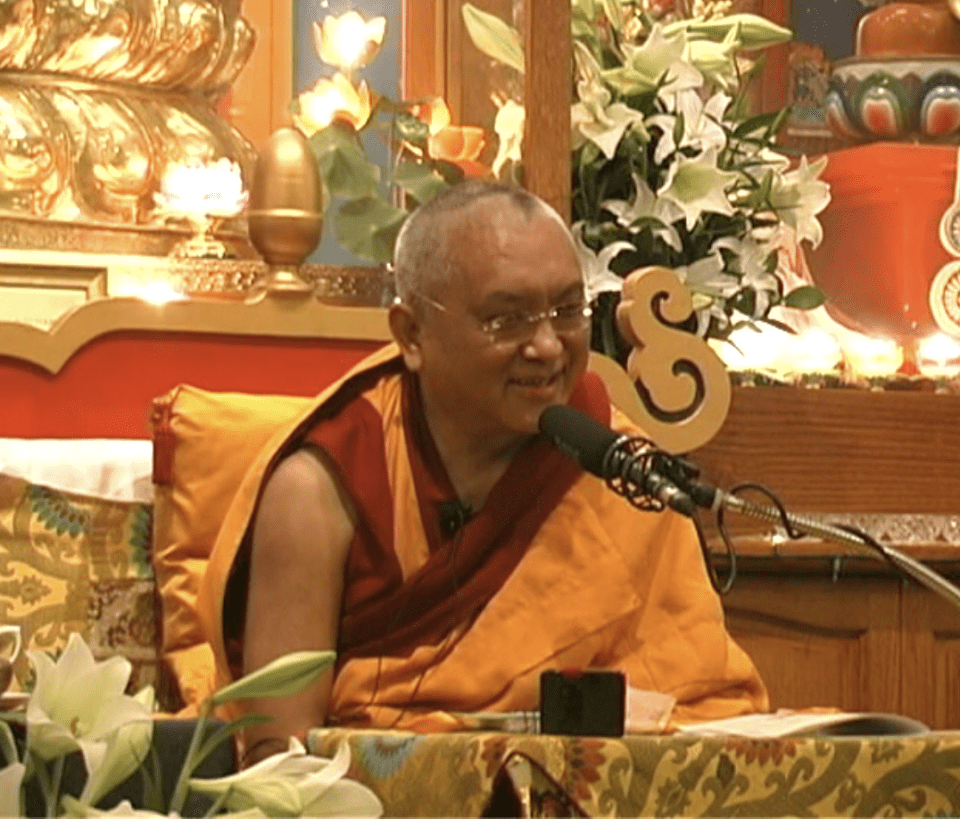
Lama Zopa Rinpoche teaching in Australia, June 2006.
We recently shared news that four sessions of Lama Zopa Rinpoche teaching on the Eight Verses of Mind Training in 2006 from Langri Tangpa Center, Brisbane, Australia are now available on our RAN page. In these teachings Rinpoche covered a wide range of topics, including:
- The nature of emptiness and dependent arising
- How to recognize and refute the false view of inherent existence
- The importance of guru devotion on the spiritual path
- Developing bodhichitta, the altruistic intention to benefit all beings
- Practical advice on transforming daily activities into meaningful spiritual practice
Today we are sharing the second video of these teachings, “Emptiness, Dependent Arising, and Guru Devotion.”
In this session, held on June 16, 2006, Rinpoche starts by explaining on how buddhas guide sentient beings during degenerate times. He explains how the mind is the creator of moment-to-moment happiness and peace as well as the problems in day-to-day life, including depression and loneliness.
Rinpoche teaches on the differences between samsaric pleasure—which is in the nature of suffering as it doesn’t increase and doesn’t last—and lasting Dharma happiness. Rinpoche describes how renunciation, bodhicitta, emptiness, and the tantric path can lead us to ultimate happiness—enlightenment.
In conclusion, Rinpoche teaches on how to make offerings and dedicate merits.
Watch “Emptiness, Dependent Arising, and Guru Devotion”
https://www.youtube.com/watch?v=ZtGyDh4588w
As a reminder, all of these sessions are now available for students to explore as they wish.
Foundation for the Preservation of Mahayana Tradition (FPMT), is a Tibetan Buddhist organization dedicated to the transmission of the Mahayana Buddhist tradition and values worldwide through teaching, meditation and community service.
- Home
- News/Media
- Study & Practice
- About FPMT Education Services
- Latest News
- Programs
- New to Buddhism?
- Buddhist Mind Science: Activating Your Potential
- Heart Advice for Death and Dying
- Discovering Buddhism
- Living in the Path
- Exploring Buddhism
- FPMT Basic Program
- FPMT Masters Program
- FPMT In-Depth Meditation Training
- Maitripa College
- Lotsawa Rinchen Zangpo Translator Program
- Universal Education for Compassion & Wisdom
- Online Learning Center
- Prayers & Practice Materials
- Overview of Prayers & Practices
- Full Catalogue of Prayers & Practice Materials
- Explore Popular Topics
- Benefiting Animals
- Chenrezig Resources
- Death & Dying Resources
- Lama Chopa (Guru Puja)
- Lama Zopa Rinpoche: Compendium of Precious Instructions
- Lama Zopa Rinpoche: Life Practice Advice
- Lama Zopa Rinpoche Practice Series
- Lamrim Resources
- Mantras
- Prayer Book Updates
- Purification Practices
- Sutras
- Thought Transformation (Lojong)
- Audio Materials
- Dharma Dates – Tibetan Calendar
- Translation Services
- Publishing Services
- Teachings and Advice
- Find Teachings and Advice
- Lama Zopa Rinpoche Advice Page
- Lama Zopa Rinpoche: Compendium of Precious Instructions
- Lama Zopa Rinpoche Video Teachings
- ༧སྐྱབས་རྗེ་བཟོད་པ་རིན་པོ་ཆེ་མཆོག་ནས་སྩལ་བའི་བཀའ་སློབ་བརྙན་འཕྲིན།
- Podcasts
- Lama Yeshe Wisdom Archive
- Buddhism FAQ
- Dharma for Young People
- Resources on Holy Objects
- Ways to Offer Support
- Centers
- Affiliates Area
- Teachers
- Projects
- Charitable Projects
- Make a Donation
- Applying for Grants
- News about Projects
- Other Projects within FPMT
- Support International Office
- Projects Photo Galleries
- Give Where Most Needed
- FPMT
- Shop
Translate*
*powered by Google TranslateTranslation of pages on fpmt.org is performed by Google Translate, a third party service which FPMT has no control over. The service provides automated computer translations that are only an approximation of the websites' original content. The translations should not be considered exact and only used as a rough guide.It’s the foggy mind, the mind that’s attracted to an object and paints a distorted projection onto it, that makes you suffer. That’s all. It’s really quite simple.







